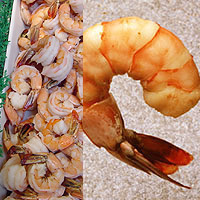health guides
Shrimp

Varieties
Shrimp can be sold raw with heads and shells intact; raw with shells on and heads removed; raw and peeled; or peeled, cooked, and deveined. They are sold by the “count,” which is the number of shrimp per pound (454g). Shrimp can be frozen individually (called IQF), or in blocks. Most shrimp sold in U.S. supermarkets and fish markets have been frozen and thawed. Shrimp are also available tinned.
There are thousands of varieties of shrimp, but those we eat fit into two categories.
Warm-water shrimp
These tend to be medium to large in size. Types include white shrimp, pink shrimp, and brown shrimp—all of which have pink meat when cooked. Rock shrimp have sweet meat within shells that are difficult to peel. Freshwater shrimp (or Malaysian prawns) come from lakes and river deltas in Asia and can grow to weigh nearly a pound (454g).
Cold-water shrimp
These tend to be smaller, but have firmer, sweeter meat. Pacific ocean pink and Atlantic Northern pink shrimp are usually machine-peeled, cooked, and served as shrimp meat. Spot, sidestrip, and coon shrimp live in North Atlantic waters and are usually sold fresh.
Copyright © 2024 TraceGains, Inc. All rights reserved.
Learn more about TraceGains, the company.
The information presented in the Food Guide is for informational purposes only and was created by a team of US–registered dietitians and food experts. Consult your doctor, practitioner, and/or pharmacist for any health problem and before using any supplements, making dietary changes, or before making any changes in prescribed medications. Information expires December 2024.


 We are proud to announce that
We are proud to announce that  As the market evolves, customers increasingly request a wider variety of omega-3 options for their lipid...
As the market evolves, customers increasingly request a wider variety of omega-3 options for their lipid...  Maintaining healthy glucose levels is crucial for preventing metabolic conditions like diabetes,...
Maintaining healthy glucose levels is crucial for preventing metabolic conditions like diabetes,...  Looking at formulating a new vitamin blend? Discover
Looking at formulating a new vitamin blend? Discover 







































